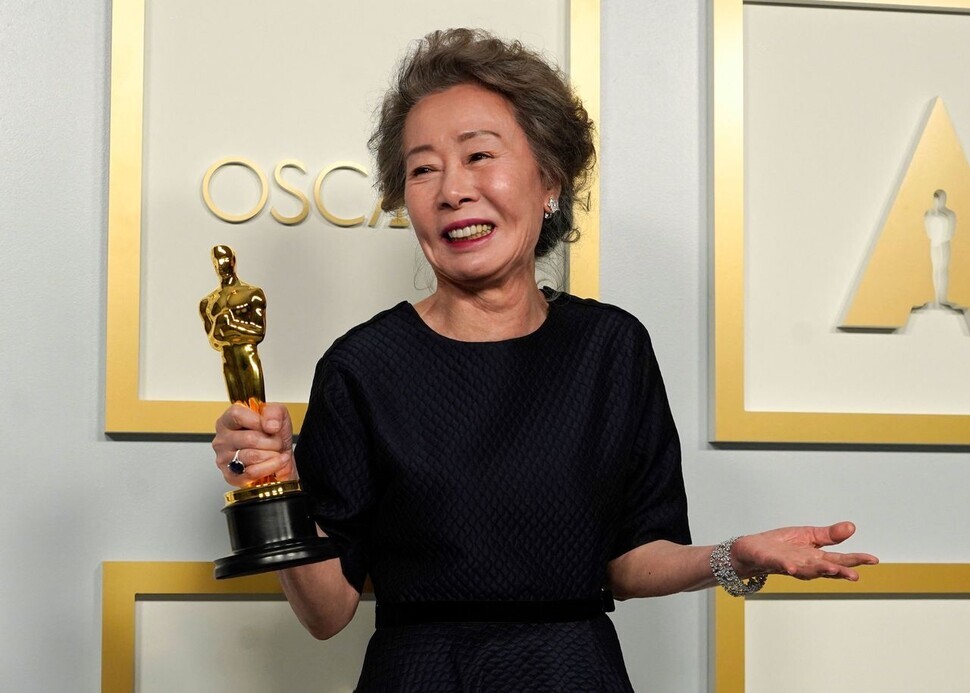hankyoreh
Links to other country sites 다른 나라 사이트 링크
[Editorial] “Minari” star Youn Yuh-jung’s Oscar win transcends race, nationality

Youn Yuh-jung became the first Korean actor to win an Oscar at the 93rd Academy Awards on Sunday night. The speech she delivered upon being named best supporting actress sparkled with wit.
“My name is Yuh-jung Youn, but most European people call me ‘Yuh-young,’ and some of them call me ‘Yoo-jung.’ But tonight, you are all forgiven,” she said.
There was a tangible pathos in the words of Korean actress who touched people around the world through the medium of film despite having a name that’s hard for Westerners to pronounce. Youn’s role as grandmother in a family of Korean immigrants evoked universal emotions that surmounted the barriers of race and nationality.
Youn starred in “Minari,” a film about a Korean immigrant family that tries to put down roots in Arkansas, in the American South, in the 1980s. In her role as Soon-ja, Youn played a grandmother who sacrifices everything for her family while not being shackled to traditional conventions. She teaches her grandchildren the Korean card game Go-Stop and gets excited about pro wrestling, all while embodying the spirit of the indomitable minari (water dropwort), which can take root anywhere.
More than thirty of the hundred or so awards that “Minari” has won at various ceremonies have honored Youn, showing how Soon-ja has struck a chord with audiences around the world.
Indeed, Youn, who turned 74 years old this year, has had to overcome numerous boundaries and hurdles in her career as an actress. After entering the industry in 1966, her breakout role came with “Woman of Fire,” the 1971 film directed by Kim Ki-young. But not long afterward, she got married and headed to the US, spending a decade away from acting.
After Youn’s divorce, she returned to acting to make a living and support her children. “I staked my life on my acting,” she recalled. It wasn’t until her sixties that she had the luxury of picking films she wanted to shoot and directors she liked.
Youn has kept trying new things while knocking down stereotypes about “old actresses” one after another. She took on unconventional roles in “A Good Lawyer’s Wife” (directed by Im Sang-soo) and “The Bacchus Lady” (directed by E J-yong). In 2020, she did a favor for younger director Kim Cho-hee by starring pro bono in “Lucky Chan-Sil,” distilling her wisdom into the role.
Despite being an A-list actor, Youn is down to earth, and her wit, humor, and insight into life have earned her the younger generation’s respect as an outstanding role model.
The Academy’s decision to give this year’s award for best supporting actress to Youn, an Asian, can be seen as reflecting a broader campaign to overcome hatred of Asians, which has gotten worse during the COVID-19 pandemic.
The Washington Post said that this year’s Academy Awards sent a message of diversity and inclusivity, noting that Youn was given best supporting actress and Chinese-American Chloé Zhao best director for “Nomadland,” becoming the first woman of Asian descent to win that Oscar.
“It’s not very nice to divide [people into different races]. If we put all the colors together, it makes it prettier [like a rainbow],” Youn said in a press conference following the award ceremony.
“We are equal human beings with the same warm heart,” Youn added, calling on her listeners to “understand each other and […] embrace each other.”
We hope that Youn’s award represents a significant step toward people worldwide understanding each other better and stepping over the boundaries of race, nation, and language.
Please direct comments or questions to [english@hani.co.kr]

Editorial・opinion
![[Editorial] Penalties for airing allegations against Korea’s first lady endanger free press [Editorial] Penalties for airing allegations against Korea’s first lady endanger free press](https://flexible.img.hani.co.kr/flexible/normal/500/300/imgdb/original/2024/0502/1817146398095106.jpg) [Editorial] Penalties for airing allegations against Korea’s first lady endanger free press
[Editorial] Penalties for airing allegations against Korea’s first lady endanger free press![[Editorial] Yoon must halt procurement of SM-3 interceptor missiles [Editorial] Yoon must halt procurement of SM-3 interceptor missiles](https://flexible.img.hani.co.kr/flexible/normal/500/300/imgdb/child/2024/0501/17145495551605_1717145495195344.jpg) [Editorial] Yoon must halt procurement of SM-3 interceptor missiles
[Editorial] Yoon must halt procurement of SM-3 interceptor missiles- [Guest essay] Maybe Korea’s rapid population decline is an opportunity, not a crisis
- [Column] Can Yoon steer diplomacy with Russia, China back on track?
- [Column] Season 2 of special prosecutor probe may be coming to Korea soon
- [Column] Park Geun-hye déjà vu in Yoon Suk-yeol
- [Editorial] New weight of N. Korea’s nuclear threats makes dialogue all the more urgent
- [Guest essay] The real reason Korea’s new right wants to dub Rhee a founding father
- [Column] ‘Choson’: Is it time we start referring to N. Korea in its own terms?
- [Editorial] Japan’s rewriting of history with Korea has gone too far
Most viewed articles
- 160% of young Koreans see no need to have kids after marriage
- 2Months and months of overdue wages are pushing migrant workers in Korea into debt
- 3[Editorial] Penalties for airing allegations against Korea’s first lady endanger free press
- 4Historic court ruling recognizes Korean state culpability for massacre in Vietnam
- 5Presidential office warns of veto in response to opposition passing special counsel probe act
- 6[Guest essay] How Korea must answer for its crimes in Vietnam
- 7Story of massacre victim’s court victory could open minds of Vietnamese to Korea, says documentarian
- 8Historic verdict on Korean culpability for Vietnam War massacres now available in English, Vietnames
- 9Bills for Itaewon crush inquiry, special counsel probe into Marine’s death pass National Assembly
- 10In rejecting statute of limitations defense in massacre case, Korean court faces up to Vietnam War a